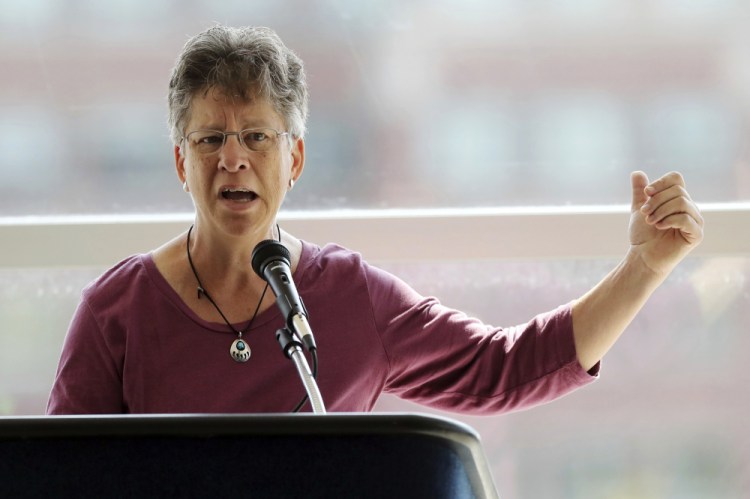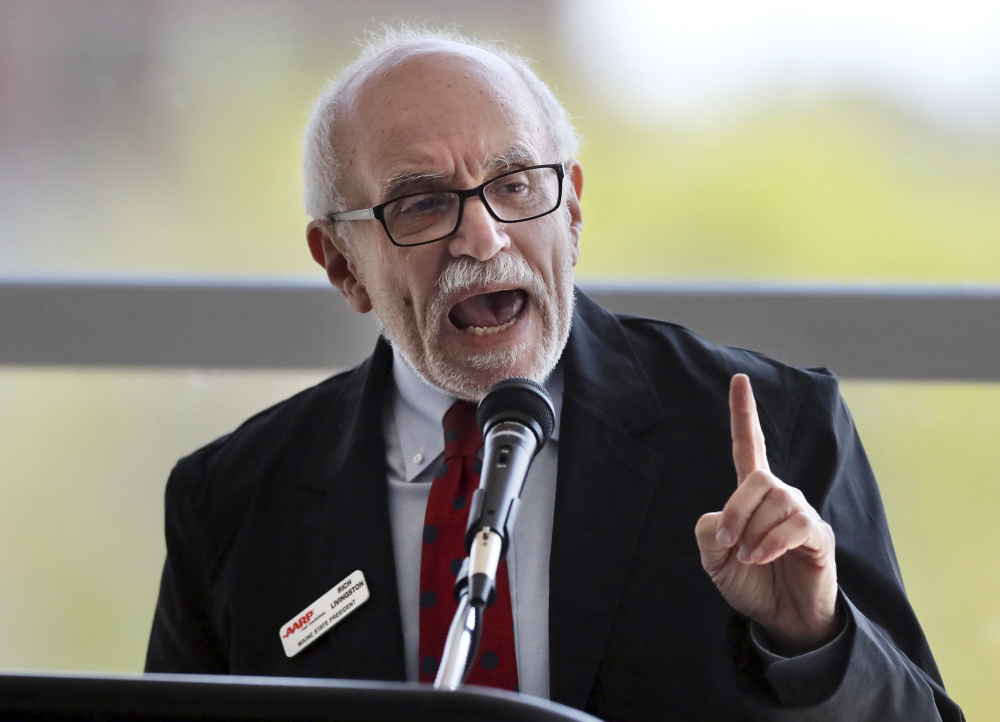Judy Bullard says MaineCare is keeping her alive, and she would be in dire straits if she lost her health insurance and could no longer afford her epilepsy medication.
“If I don’t have health care, I will die,” Bullard said. “I need medication not just to live a happy and healthy life, but to stay alive.”
Bullard, 56, of Old Orchard Beach, testified at Cross Insurance Arena in Portland on Wednesday at a Maine Department of Health and Human Services public hearing. About 100 people attended and more than a dozen testified.
The hearing was on the state’s request for a federal waiver that would allow Maine to impose new mandates on some MaineCare recipients, such as work or volunteer requirements, modest premiums and $20 fees for missed appointments and inappropriate use of hospital emergency rooms. About 270,000 residents receive MaineCare, the state’s Medicaid program, which is free for those who qualify. Medicaid is a federal program administered by the states that is funded with a blend of federal and state dollars.
Most MaineCare recipients are children, disabled persons or low-income seniors who qualify for both Medicare and MaineCare.
About 46,000 MaineCare recipients would fall under the work and premium requirements, according to Maine DHHS. Whether Bullard would actually be denied MaineCare, or be required to work to continue to receive benefits, is unclear. The waiver does carve out exceptions for people who have serious health conditions.
While states have some leeway to determine which categories of people to cover with Medicaid funds, the federal government has many mandates that states must follow. To charge people a modest premium or require some people to work to receive health benefits, Maine must seek permission from the U.S. Centers for Medicare and Medicaid Services. The state’s executive branch can apply for a waiver without approval from the Legislature, but it must hold public hearings like the one in Portland on Wednesday.
Six states have received federal waivers allowing them to charge premiums for some Medicaid recipients, according to the Kaiser Family Foundation.
DHHS Commissioner Mary Mayhew said the goal is for able-bodied Mainers to work or volunteer. It is modeled after the 1996 welfare reforms approved by President Bill Clinton and a Republican Congress.
“Our goal is to support individuals moving into the workforce and getting access to coverage through employment,” Mayhew said. “Part of the idea is that this is not free. Individuals need to appreciate the costs associated with providing the care.”
Maine officials believe that the Trump administration is more likely to grant Maine a waiver than the Obama administration was because both Trump and Maine Gov. Paul LePage are Republicans and share a similar political philosophy.
But Chris Hastedt, public policy director of Maine Equal Justice Partners, an Augusta-based advocacy group, said the waiver would result in fewer people working, not more, because having access to health care provides stability that makes it easier to hold a job. For instance, those with chronic conditions that are treated are more likely to join the workforce, she said. But those whose chronic conditions are left untreated could end up out of the workforce and fall further into poverty.
“The employment requirements turn the purpose of this program on its head,” Hastedt said. “The bottom line is we believe the consequences of this waiver is that thousands would lose access to health care.”
But Maine DHHS, in its waiver request, said that “employment and education are key factors to moving individuals out of poverty.”
“Medicaid must embrace private market policies and principles,” the waiver request said. “Many of these initiatives have the added benefit of transitioning MaineCare members into active consumers of health care who are better prepared to transition to commercial health insurance.”
If the waiver is approved, some people receiving MaineCare would need to work at least 20 hours per week or volunteer 24 hours per month.
Hastedt said there are many people who would lose their health insurance because they may not qualify for disability waivers of the work requirement, but their chronic ailments prevent them from working. Bullard said her epilepsy makes working extremely difficult.
Also, MaineCare recipients who are able-bodied adults would be required to pay a monthly premium, ranging from $14 to $66, depending on income.
Those earning more than 100 percent of the federal poverty limit, depending on their age and other factors, may be able to find a less expensive plan through the Affordable Care Act’s individual marketplace.
But advocates for low-income residents said the monthly premiums would also result in people losing health insurance.
“Are we really asking people to choose between housing, food and health care?” said Jon Bradley, associate director of Preble Street, a Portland nonprofit that provides services for poverty-stricken Mainers. “Twenty dollars is … a lot of money if you don’t have it.”
Joe Lawlor can be contacted at 791-6376 or at:
jlawlor@pressherald.com
Twitter: joelawlorph
Send questions/comments to the editors.




